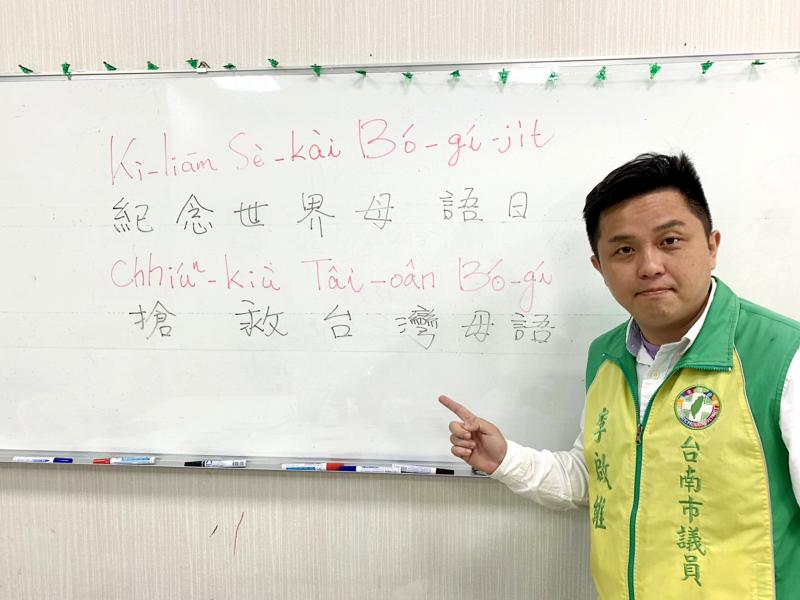Tainan City Councilor Lee Chi-wei (李啟維) yesterday called for the use of Romanized spellings to make Taiwanese dialects and languages internationally recognizable.
Speaking at a news conference in Tainan to mark International Mother Language Day, Lee said the use of zhuyin fuhao (注音符號, Mandarin phonetic symbols commonly known as Bopomofo) made it difficult to promote interest in, or recognition of, the nation’s dialects and languages, as the system is not commonly used outside of Taiwan.
“The legislature has already passed the Development of National Languages Act (國家語言發展法), but under the current circumstances that act is like a candle in the wind,” he said, describing it as ineffectual given the lack of a Romanized system.

Photo: Tsai Wen-chu, Taipei Times
Taiwan’s achievements in technology and combating the spread of COVID-19 have earned it international recognition, but it has not achieved the same success in promoting interest in its languages, he said.
The education system, through which Taiwanese learn to use Bopomofo, failed to recognize its shortcomings, he said, adding that using Romanization to teach students would be in line with the government’s expressed interest in “internationalizing” the nation.
Lee, of the Democratic Progressive Party, said he had met older Taiwanese who are unable to read their vehicle license plates, because they had never learned the English alphabet.
Taiwan uses English letters for its license plates, because this is the international standard, so the country’s dialects should also be written according to this standard, he said.
“Zhuyin fuhao has 37 symbols, which are usable only to describe Chinese phonetics. In contrast, English has only 26 letters and can be used to write languages worldwide,” he said, adding: “Can the government not follow that reasoning?”
Although he recognized the arguments made by those promoting localization, Lee said that he was concerned to see Taiwan’s languages disappear into obscurity.
“Perhaps if it weren’t for missionaries who wrote down Taiwan’s dialects for use in proselytizing, they would not have survived until today,” he said.

A relatively large earthquake may strike within the next two weeks, following a magnitude 5.2 temblor that shook Taitung County this morning, the Central Weather Administration (CWA) said. An earthquake struck at 8:18am today 10.2km west of Taitung County Hall in Taitung City at a relatively shallow depth of 6.5km, CWA data showed. The largest intensity of 4 was felt in Taitung and Pingtung counties, which received an alert notice, while areas north of Taichung did not feel any shaking, the CWA said. The earthquake was the result of the collision between the Philippine Plate and the Eurasian Plate, the agency said, adding

Snow fell in the mountainous areas of northern, central and eastern Taiwan in the early hours of yesterday, as cold air currents moved south. In the northern municipality of Taoyuan, snow started falling at about 6am in Fusing District (復興), district head Su Tso-hsi (蘇佐璽) said. By 10am, Lalashan National Forest Recreation Area, as well as Hualing (華陵), Sanguang (三光) and Gaoyi (高義) boroughs had seen snowfall, Su said. In central Taiwan, Shei-Pa National Park in Miaoli County and Hehuanshan National Forest Recreation Area in Nantou County saw snowfall of 5cm and 6cm respectively, by 10am, staff at the parks said. It began snowing

HOLIDAY EXERCISE: National forest recreation areas from north to south offer travelers a wide choice of sights to connect with nature and enjoy its benefits Hiking is a good way to improve one’s health, the Forestry and Nature Conservation Agency said, as it released a list of national forest recreation areas that travelers can visit during the Lunar New Year holiday. Taking a green shower of phytoncides in the woods could boost one’s immunity system and metabolism, agency Director-General Lin Hwa-ching (林華慶) cited a Japanese study as saying. For people visiting northern Taiwan, Lin recommended the Dongyanshan National Forest Recreation Area in Taoyuan’s Fusing District (復興). Once an important plantation in the north, Dongyanshan (東眼山) has a number of historic monuments, he said. The area is broadly covered by

COMMUNITY SPIRIT: As authorities were busy with post-typhoon cleanups elsewhere, residents cleaned fallen leaves and cut small fallen trees blocking the hiking trails All hiking trails damaged by Typhoon Kong-rey have been repaired and has reopened for people who want a refreshing hike in Taipei during the Lunar New Year holiday, a city official said. The Taipei Basin is known for its easily accessible hiking trails. It has more than 130 trails combined into the 92km-long Taipei Grand Trail, which was divided into seven major routes when it was launched by the Taipei City Government in 2018. Last year, a part of the sixth route of the Grand Trail collapsed due to Typhoon Kong-rey, which hit Taiwan in October. The damaged section belongs to one